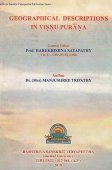Maharana, Mahārāṇā: 7 definitions
Introduction:
Maharana means something in Hinduism, Sanskrit, the history of ancient India. If you want to know the exact meaning, history, etymology or English translation of this term then check out the descriptions on this page. Add your comment or reference to a book if you want to contribute to this summary article.
In Hinduism
Purana and Itihasa (epic history)
Source: archive.org: Shiva Purana - English TranslationMahāraṇa (महारण) refers to “great warfare”, according to the Śivapurāṇa 2.4.8 (“The battle between the gods and Asuras”).—Accordingly, as Brahmā narrated to Nārada: “[...] In the same manner, O dear, the guardians of the quarters, though powerful, were defeated in battle by the Asuras, great experts in warfare (mahāraṇa-viśārada). The other gods too were fought and defeated by the Asuras. Unable to bear their ferocity they took to flight. The victorious Asuras, their effort having been successful, roared like lions and raised shouts of jubilation. [...]”

The Purana (पुराण, purāṇas) refers to Sanskrit literature preserving ancient India’s vast cultural history, including historical legends, religious ceremonies, various arts and sciences. The eighteen mahapuranas total over 400,000 shlokas (metrical couplets) and date to at least several centuries BCE.
India history and geography
Source: Cologne Digital Sanskrit Dictionaries: Indian Epigraphical GlossaryMahārāṇā.—(EI 21, 24; BL), derived from Mahārāṇaka; feudatory title; later, also a royal title. See Rāṇā and Rāṇaka. Note: mahārāṇā is defined in the “Indian epigraphical glossary” as it can be found on ancient inscriptions commonly written in Sanskrit, Prakrit or Dravidian languages.

The history of India traces the identification of countries, villages, towns and other regions of India, as well as mythology, zoology, royal dynasties, rulers, tribes, local festivities and traditions and regional languages. Ancient India enjoyed religious freedom and encourages the path of Dharma, a concept common to Buddhism, Hinduism, and Jainism.
Languages of India and abroad
Sanskrit dictionary
Source: Cologne Digital Sanskrit Dictionaries: Benfey Sanskrit-English DictionaryMahāraṇa (महारण).—great battle,
Mahāraṇa is a Sanskrit compound consisting of the terms mahā and raṇa (रण).
Source: Cologne Digital Sanskrit Dictionaries: Cappeller Sanskrit-English DictionaryMahāraṇa (महारण).—[masculine] great battle.
Source: Cologne Digital Sanskrit Dictionaries: Monier-Williams Sanskrit-English Dictionary1) Mahāraṇa (महारण):—[=mahā-raṇa] [from mahā > mah] m. a gr° battle, [Āpastamba-śrauta-sūtra [Scholiast or Commentator]; Mahābhārata; Pratāparudrīya]
2) [v.s. ...] [varia lectio] for mahīraṇa, (q.v.), [Viṣṇu-purāṇa]
[Sanskrit to German]
Sanskrit, also spelled संस्कृतम् (saṃskṛtam), is an ancient language of India commonly seen as the grandmother of the Indo-European language family (even English!). Closely allied with Prakrit and Pali, Sanskrit is more exhaustive in both grammar and terms and has the most extensive collection of literature in the world, greatly surpassing its sister-languages Greek and Latin.
See also (Relevant definitions)
Starts with: Maharanaka, Maharanavisharada.
Ends with: Anekavarnamadhyamaharana, Brahmaharana, Madhyamaharana, Samaharana, Somaharana.
Full-text: Agamya, Mahameru-shri-kirtistambha.
Relevant text
Search found 4 books and stories containing Maharana, Mahārāṇā, Mahāraṇa, Maha-rana, Mahā-raṇa; (plurals include: Maharanas, Mahārāṇās, Mahāraṇas, ranas, raṇas). You can also click to the full overview containing English textual excerpts. Below are direct links for the most relevant articles:
Stupas in Orissa (Study) (by Meenakshi Chauley)
Sahajayana (in Tantric Buddhism) < [Chapter 2]
Vajrayana form of Buddhism < [Chapter 2]
Tantric Buddhism in Orissa (Introduction) < [Chapter 2]
Lakulisha-Pashupata (Philosophy and Practice) (by Geetika Kaw Kher)
History of Lakulisa-Pasupata order < [Chapter 1 - The Historical Context]
Folk Tales of Gujarat (and Jhaverchand Meghani) (by Vandana P. Soni)
Chapter 37 - Bapu Bhalalo < [Part 5 - Rang Chee Barot]
Related products
